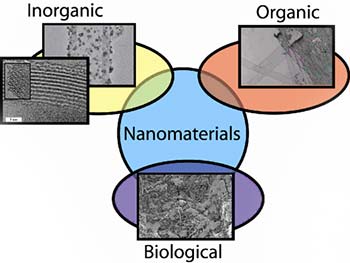Nanomaterials

Nanomaterials represent a new class of materials, where ever-smaller length scales (<100 nm) impart altered or enhanced properties. Two challenges in this area are (i) control of the structure of nanomaterials and (ii) controlling and defining the spatial placement of such materials. Nanomaterials research at Yale focuses on both these challenges through the synthesis and assembly of new hard and soft materials, approaching sizes as small as the molecular- to atomic scale. Whether created from self-assembly, chemical vapor deposition, solvothermal synthesis, or nanofabrication, these nanomaterials are poised to make great advances in the areas of solar cells, fuel cells, optical computing, biological science, catalysis, biomass conversion, and smart materials.
We specialize in structure selectivity during synthesis to meet the requirements of these applications. For example the great promise of carbon nanotubes has not been met due to the large range of sizes and structures made in normal syntheses. Examples of current nanomaterials research projects at Yale include the synthesis and assembly of carbon nanotubes for solar and fuel cell applications, single-walled GaN nanotubes and other optically active nanomaterials for solar cells, regrowth of carbon nanotubes to obtain specified structures, mesoporous oxides for templating other nanomaterials and for use in solar cells and fuel cells, boron nanotubes for high temperature superconductivity and the use of functionalized nanotubes for antibody stimulation, vaccine delivery and antibacterial coatings, and polymeric nanowires for energy and sensing applications.
Research groups at Yale in nanomaterials actively pursue organic (Elimelech, Kim, Fahmy, Van Tassel, Ismail-Beigi), inorganic (Haller, Hu, Pfefferle, Ismail-Beigi), and biological nanomaterials (Haller, Pfefferle, Elimelech, Fahmy, Van Tassel).

